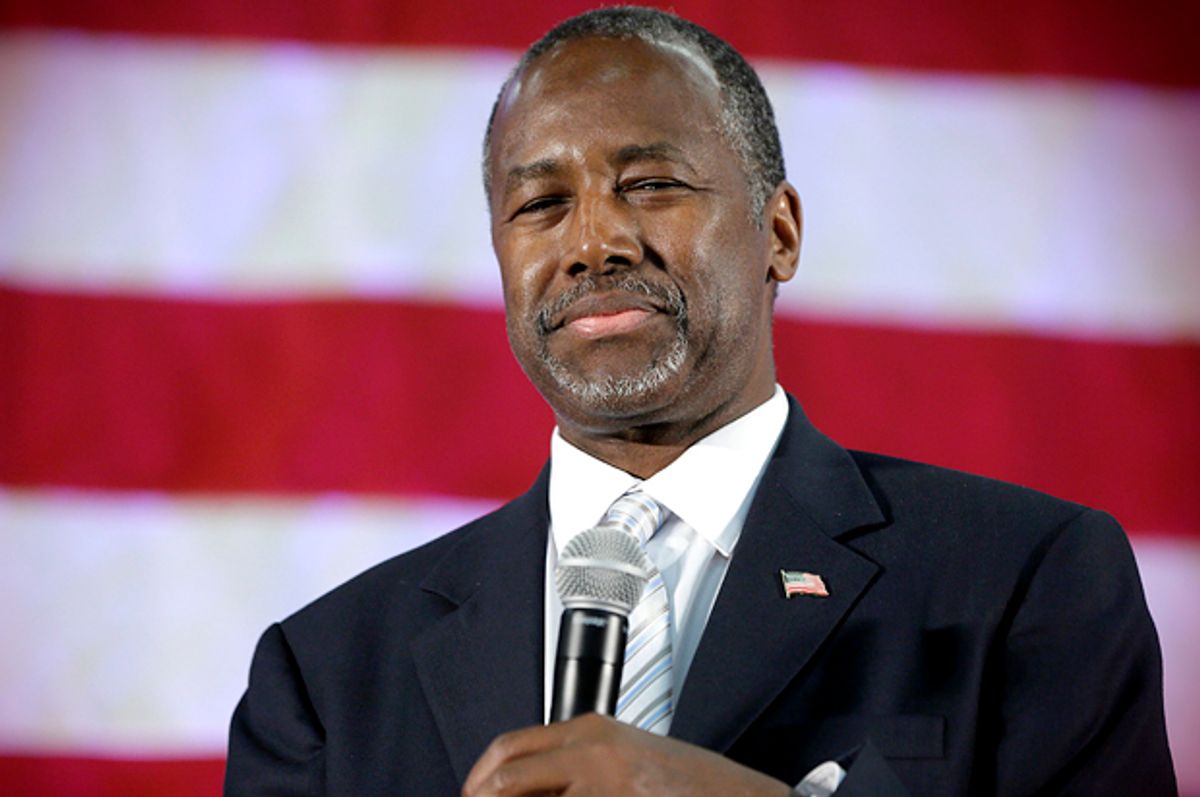Ben Carson sure does love to talk about Hitler. The retired neurosurgeon and top-tier Republican presidential candidate has endeared himself to the conservative movement through his willingness to fight “political correctness” by saying outrageous garbage about President Obama, and he has a special love of invoking the Third Reich when talking about the current state of our government. “I know you're not supposed to say 'Nazi Germany,' but I don't care about political correctness,” he said in an interview last year. “You know, you had a government using its tools to intimidate the population. We now live in a society where people are afraid to say what they actually believe.”
That’s a very dumb thing for a person to say, but now it’s part of the Ben Carson 2016 campaign messaging effort. On the trail in New Hampshire this week, Carson tried explaining to reporters that another Adolf Hitler could come to power in America because we’re just too politically correct to prevent it from happening:
When another reporter asked if he was comparing President Barack Obama to Hitler, Carson said, "No. I am saying in a situation where people do not express themselves, bad things can happen."
Earlier, Carson had said, "If people don't speak up for what they believe, then other people will change things without them having a voice. Hitler changed things there and nobody protested. Nobody provided any opposition to him."
This is insane. If your thesis for why Hitler rose to power in Germany in the 1930s is “too much political correctness,” then you’re overlooking a few important contributing factors.
War. Germany’s defeat in World War I was a critical component of Hitler’s appeal to the German people. The Nazi platform railed against the traitors within the German government who had needlessly surrendered to the Western allies and agreed to the punitive terms of the Treaty of Versailles, which forced reparations payments and economic and military restrictions on Germany. Hitler and the Nazis appealed directly to the sense of German nationalism and promised a return to the glory days of the pre-war German empire, and they were enthusiastic promoters of the Dolchstosslegende, which maintained that the country had been “stabbed in the back” by its internal enemies: communists, moderate politicians, and Jews.
Depression: Already hamstrung by the terms of the Treaty of Versailles and battered by a hyperinflation crisis years earlier, the German economy imploded when the Great Depression struck in the late 20s. Absurdly high unemployment put an untenable strain on government welfare programs. The catastrophically bad economic conditions and the inability of the Weimar government to provide economic relief enabled the Nazis to position themselves as the beneficiaries of popular resentment towards the government.
Political Dysfunction: The Weimar Republic of the 20s and early 30s was a feeble, sclerotic, and widely despised government that did little but breed popular contempt for the very idea of representative democracy. The structure and platform of the Nazi Party – a hypernationalist organization that preached strict unity and had an authoritarian strongman making all the critical decisions – were direct challenges to the Weimar system of government and appealed to people who had lost faith in the chaotic dysfunction of the republic.
Violence: The idea that nobody “protested” against Hitler and the Nazis isn’t true. There were plenty of powerful political groups (communists, social democrats) that vocally opposed Hitler and the Nazi Party. But the consequences of those protests were harsh: beatings by stormtroopers, detention in concentration camps, forced emigration, and murder. One didn’t even need to protest – simply being associated with a group the Nazis considered detrimental to the health of the German state made you a target.
All this to say that Ben Carson’s view of history and the allegedly pernicious role of “political correctness” in shaping national governments is facile to the point of being absurd. And that matters because opposition to “political correctness” is the idea that motivates the Ben Carson presidential campaign. Hitler didn’t rise to power the back of “political correctness” – he took advantage of an unfortunate confluence of uniquely atrocious political and economic situations. If Ben Carson honestly believes that we’re now susceptible to the same threat that Hitler posed to Germany in the 1930s, then all he’s revealing is his own ignorance and his basic lack of faith in our governing institutions and national character.


Shares